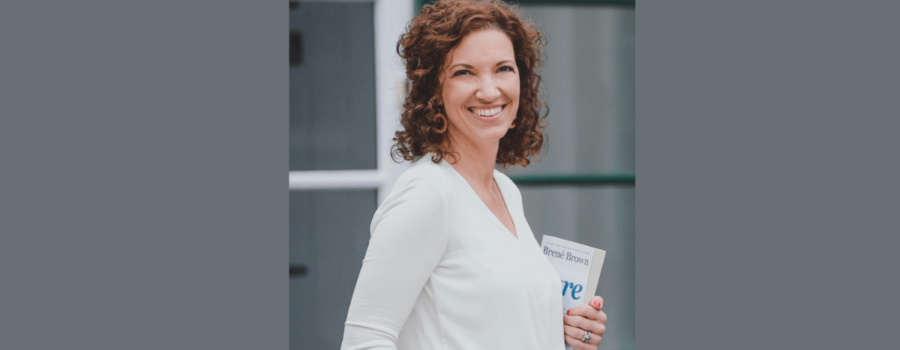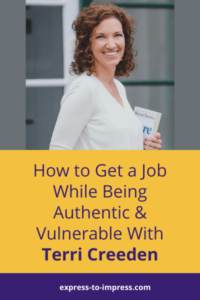Introduction to Conversation With Terri Creeden
Hello! It’s Kristine here with the Express to Impress podcast. This week, I am very excited to welcome a very special guest on the show today. I am joined by Terri Creeden, an executive coach, trainer, and facilitator.
Can’t read now? Pin it for later!
Terri is a Professional Coach through the International Coach Federation (ICF) and a Certified Daring Way Facilitator and Dare to Lead facilitator through the Brené Brown Education and Research Group. I learned about Terri and her work while attending a terrific ICF workshop she hosted in April: It was “Dare to Lead & Courageous Coaching: How to be brave in your coaching arenas.” Terri, welcome to the show!
Terri
Thank you, Kristine. You know it’s one of my favorite topics to talk about. So happy to be here and share with your audience.
Kristine
Awesome. So yes, our topic today will be how authenticity and vulnerability can help your job search. So to kick off the episode, Terry, I’d love for you to share more about yourself and your work for our listeners.
Terri
Yeah, so you ran through my bio, which is kind of you to share all of that. So I guess that sums up who I am today, but it probably doesn’t sum up all of me because I wasn’t always a coach and a trainer, and I wasn’t always involved with this work on vulnerability, right? I went through my own journey to get here. My original career was actually in medical genetics and public health. And after that, I transitioned to the pharmaceutical industry, where I worked doing internal communications for the leaders in that organization. It was for work with those leaders that really compelled me to go into coaching, and now I feel like I’m right where I belong, but that career journey actually kicked off my vulnerability journey as well.
Introduction to Being Authentic & Vulnerable
Kristine
Absolutely. What an interesting background. I love that you’ve had different careers and found a way to bring all of it into your coaching. So can you tell me what started your journey into vulnerability and authenticity? Could you tell me more about what sparked your interest in these topics?
Terri
Ooh, I love the word sparked because it makes it sound so exciting and positive! So the short answer to what sparked my interest in vulnerability was my own suffering. The back story is that it really came to my attention when I was transitioning careers when I was leaving pharmaceuticals, and I was re-training to become a coach.
I had gone to a coach training program, and I went there thinking I was going to be trained in a new career, but as part of any good coach training program, they require you to have coaching yourself. So the whole first part of it is this personal development journey of your own. And I was not fully aware of that necessity going into the program. I might have said no, but I’m glad I didn’t know. When I had to do that, I thought,
Okay, well, everything is going fine for me. You know, I’m getting my new career. I have a husband and two kids. Everything’s fine. So, it’s really not like I have things to talk to a coach about, but let me come up with a few things that I could discuss.
So, I made a shortlist, which ended up not being so short when I really started putting down what things were bugging me and getting in my own way: control, perfectionism, pleasing. And in the end, I thought, you know what I really want out of life? I want deeper, more meaningful connections with the people in my life. But I don’t know how to get it. I’m like, “Okay, the coach can help me with that.”
But when I started being coached, what I realized was I didn’t have a long list of things that needed work. I had one underlying issue that was driving all of them. That was my hesitance to be vulnerable, to lean into any sort of risk, uncertainty, or emotional exposure. I mean, I’m a pretty open person. I’m a pretty extroverted person, so I don’t think I would have seen myself as somebody was holding back at all. I’ve done daring things. I’ve moved from the U.S. to Switzerland; from Switzerland to China and back to Switzerland again. I’ve done daring things but daring with those sort of adventurous things is one thing, but daring to open up and share an authentic part of you, or a messy part of you; that’s something very, very different, and that’s where I was having trouble.
Kristine
Thank you for being vulnerable and sharing the root of your interest in this area. I appreciate it because I certainly have a lot of listeners who are in difficult moments in their careers. They’re trying to decide what is next, or they’ve been trying to get what’s next, and they’re struggling, so they’re in those vulnerable moments.
Terri
For sure.
Being Authentic & Vulnerable While Searching for a Job
Kristine
So, what advice do you have for job seekers with regards to vulnerability? How can they lean into it, or how can they allow it to help them in some way?
Terri
I like the phrase “leaning into it” because also people say, how can I try to be vulnerable? How can I be vulnerable? If it’s, you know, a good thing? And you don’t have to try to be vulnerable because we all already are vulnerable. Life is vulnerable. There’s vulnerability all around us. I think leaning into vulnerability is the right phrase because it implies leaving off any of the shiny polished armor that we put on to try to look anything other than our authentic selves.
So, I guess my one-word advice to your audience, your listeners who are going into these interviews, is to stop trying to impress people, which is contrary advice, right? Because that’s exactly what you’re trying to do in an interview is to make an impression, of course. I get that. But don’t let it be the focus. Don’t let it be your goal. Go in as genuine and authentic as you can, and let impressing them just be a byproduct of that. You know, they (the employer) will be most impressed by an authentic person sitting in front of them and not somebody who has canned, formulated responses that they’ve heard from every other candidate. Let them see who you really are and not who they are hoping you are.
Kristine
Nice. Thank you. That’s a tough one when people want to stand out, want to impress the interviewer, but miss the bigger picture that the employer wants to get to know them, and that’s the most important thing to them.
Terri
I wanted to just add to that because what we’re doing there when we’re trying to perfect or polish our exterior, on behalf of somebody else to give some other impression, right? We are so caught up energy-wise and mental work doing to manage our image, right? And anytime we are caught up managing our image, how we look and appear, and come across to somebody else, that immediately takes us right out of authenticity. So you’re moving further away from what’s really going to win you that interview.
Kristine
That’s a great point. There are so many added stresses that are unnecessary when that’s what’s driving you.
So there are some tough interview questions and interview moments, and some of them are those questions about professional failure or weaknesses. And sometimes my clients ask me how honest they should be, or they refuse to talk about weaknesses that are truly their weaknesses out of fear. So what would you advise job seekers who are facing those tough questions?
How to Answer, “Tell Me About Your Weaknesses”
Terri
Yeah, so of course, one clever approach, and I think the approach early in my career that I always took, was to share a weakness of mine that was truly a weakness of mine, but that I knew employers would actually find value in. Like for example, I work too much; I’m a perfectionist. Okay, that’s bad for me, but it’s great for them, and maybe it will win them over, right? But I would not advise that now. Because I don’t want to work for an employer who would exploit that, and I don’t want that to be exploited in me because, look, let’s face it, neither one of those things are actually healthy.
So my best answer is, to tell the truth. Tell of a struggle or something that does trip you up. Tell an example of an actual failure or mistake you made, but then follow it up immediately with how you fixed it, how you cleaned it up, or what you learned from it. Because that shows self-awareness, self-reflection, growth, resiliency; all the stuff they’re really looking for. Because if you go in there and try to pretend you don’t have any failures or that you don’t have any weaknesses, nobody is going to believe you. They know nobody is perfect. They’re going to know you’re just trying to avoid the question. Find a weakness or failure, and not your biggest darkest secrets here, right? But, professionally, ones that definitely tripped you up but that you did learn a lesson from., so you can share both sides of it.
Kristine
That’s great. Yeah, thank you for sharing that advice. It’s also reaffirming for me when people share a weakness, and I say, “that’s not a weakness; that’s really a strength!” But that’s really tough for people to hear. But I agree that that is something that employers value so much–a person who is self-aware, who can be honest, and who is learning and growing–not somebody who has everything figured out.
Terri
Making those strides, exactly. And look, when we are honest enough about what we can and what we cannot do, yet, you also go in with a growth mindset.
You know I can’t do that yet, but that’s what I hope to, you know, lean into, or to grow into in this job opportunity.
That builds trust. And what leaders really want to see is that they can trust somebody. If you aren’t able to say, “I need help, or I can’t do that, or I don’t know how to do that,” they’re going to have trouble trusting you.
Kristine
Absolutely. And I think it’s also helpful for the employer to create an environment where you will be successful. But that is a very empowered way of looking at the interview, where it’s a two-way street. You’re both interviewing each other; both trying to find out if this is a good fit.
You know, one of the weaknesses I’ll give people as an example of mine is that I really struggle with interruptions. And this has been confusing for my coworkers in the past because perhaps they felt like I was warm, helpful, or extroverted at times, but then I had a hard time hiding that I was maybe annoyed that they’d interrupted me when I was trying to work on a report, emails, or I was right in the middle of a project. And so I understood eventually it was a weakness because you need to be able to be flexible and adapt whenever there are changes happening.
Workplaces are a dynamic environment, but whenever I was honest about it with employers, we found solutions. Ultimately, they did accommodate me somewhat to help create an environment where I was producing the best work. I wasn’t offending coworkers. I felt like some of my time and space were respected, but it was this give and take, and that’s like the best-case scenario when you’re honest about one of your weaknesses, and you can communicate about it proactively to create a work environment that’s going to work for you.
Terri
Right, and you know, that’s just actually kind to other people to let them know how best to interact with you to get the best out of you and so that they know when to come to you and how to come to you and how to approach you.
Common Mistakes Amongst Job Seekers
Kristine
Yeah. And can you think of any authenticity mistakes you have seen job seekers make and what the consequences might be?
Terri
I think the number one mistake job seekers make is lying or overselling their experience or skills. And I think this is something that most people who are guiding interviewees, or you know, crafting your resume or CV will advise. Don’t oversell something that’s not true. Don’t put something on there that you haven’t really done. And don’t make it sound bigger than it is. Because if you don’t have the skill, like I said before, you can just say, “hey no, I don’t have that,” you know. And the list of things they put on that job, not the job application but the job…
Kristine
Job description.
Terri
The job description, right? That’s a wish list. Like, it’s going to be the rare person who’s going to come in and tick all those boxes. If a new job is going to be a growth opportunity for you, you want a few things to grow into, and that can be
That’s why I’m excited about this job! I can now try to do that.
The consequence of lying is that, first of all, it’s not going to come across as authentic and genuine. They’re not going to buy it. You can’t lie with your mouth and have your body go along with it. Your body always tells the truth. So there is something about it, they won’t be sure what, but there’s something that’s not going to come across as genuine. And, if they do buy it, then you’re really in trouble because now if you get that job, you’re going to have to continue to pretend that that is something that you own and you’re going to have to scurry around trying to hurry up and gain that skill behind the scenes. That’s not a position you want to put yourself in.
Kristine
Thank you for sharing that and also for talking about the job descriptions and what they really are. There are, you know, lists of requirements, and I have read studies that show that women tend to take those requirements very literally, and it dictates which jobs they apply to, and often they want to tick off every single item before they apply for a job, whereas men are more likely to apply for jobs even if they don’t meet all of those…so about 60%. And employers want people who have most of those things, but not all of them.
Employers very commonly will choose an employee that they feel is a great fit for the team. They want to work with them. They can tell that the person has a passion for their product or their service, or what they’re doing, and they feel like, yeah, I have something to offer them. I can teach them how to build this skill. I can help them grow in some way, and so there’s this mutual benefit, but it just kills me when I see people not applying for jobs because they don’t meet 100% of those requirements.
Terri
Yeah. Don’t take yourself out of the game before the game even starts, right? If somebody went into an interview and had everything on the job description, they’ve already done that job before. And it’s unlikely that they’re going to want to do that same job again. Maybe they do, given their circumstances. I’m not sure, but I can tell you to an employer if you tick every box, they’re going to be concerned that you’re going to get bored and that you are not going to stay in the position very long.
Kristine
Yeah, that’s a great point. But it does take being honest about the things you don’t know or the boxes you can’t check off.
Terri
Yep, Yep.
Tune in For Part Two With Terri Creeden!
That brings us to the end of the first episode about being authentic and vulnerable with Terri Creeden! I invite you to tune in for the next episode to hear the rest of my conversation with Terri. We’ll talk about being authentic in an interview and hear two stories about women who leaned into vulnerability and authenticity and how it helped them in their careers.
Before I wrap up, I want to remind you that you can subscribe to receive notifications whenever I release a new episode. You can subscribe anywhere you download podcasts like Apple, or you can tune in and read the episode transcripts on my website, express-to-impress.com.
Thank you so much for listening to the Express to Impress podcast. If you found this episode useful, please remember to share it with a friend! See you next time. Bye!







Leave a Reply
Your email is safe with me.